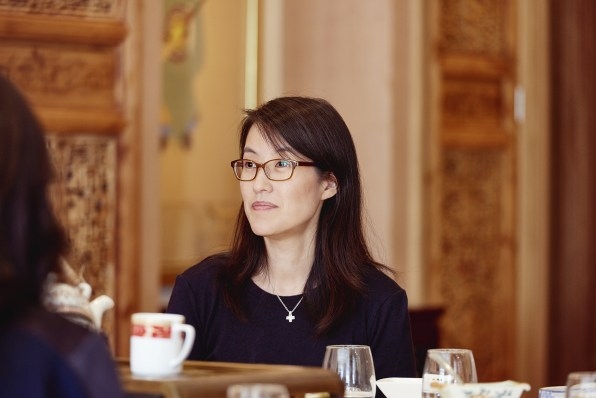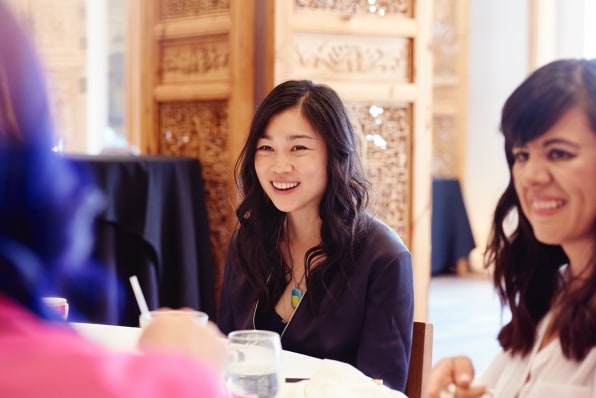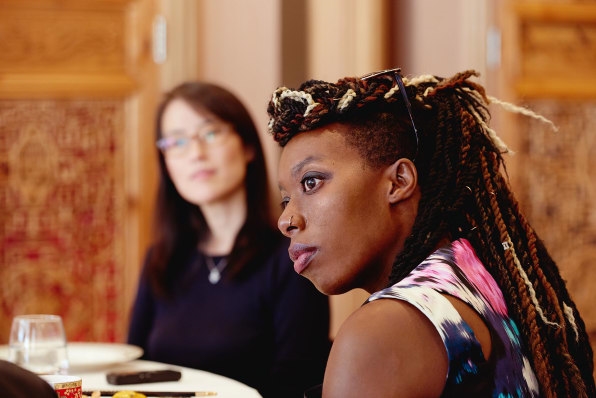“The Industry Is Fundamentally Broken”: Women On Sexism In Silicon Valley
Sexism in tech isn’t new. But 2017 has been the year that the harassment and bias that many women in Silicon Valley have long endured has come to light. Uber along with several venture capital firms have been outed for fostering environments where sexual harassment and discrimination have thrived. The fallout has been swift and public. Meanwhile, the Department of Labor is investigating wage disparity at Google, and now as many as 90 former employees are suing over similar discrepancies. (Google is also dealing with the image-tarnishing sexist “memo” leak.)
To get an honest picture of the past, present, and future for women in tech, we sat down with five of the founding members of Project Include, an organization that works with startups to make their workplaces inclusive. These women have spent decades witnessing, enduring, and fighting sexism in Silicon Valley. What follows is an edited version of our conversation late last month at Fang Restaurant in San Francisco.
Sexism In The Valley Roundtable
- Ellen Pao, chief diversity and inclusion officer and venture partner at Kapor Capital and author of Reset: My Fight for Inclusion and Lasting Change
- Y-Vonne Hutchinson, founder of employment policy and recruiting firm ReadySet
- Tracy Chou, founding member of The Arena, a summit for progressive action
- Laura I. Gomez, founder of talent discovery platform Atipica
- bethanye McKinney Blount, founder and CEO of compensation analytics and strategy tool firm Compaas at Cathy Labs
Fast Company: I’ve found that even when I’ve tried to talk to my female colleagues about the moments of discrimination or harassment that I’ve encountered in my career, the conversation is never about what to do next. It’s like, ‘Oh, he did that to you? You’ll never believe what he did to Sharon last week.’ I’m very curious about your tipping points. Where you said, I’ve seen this before, but now I feel the need to do something more than commiserate about it with other women.
Ellen Pao: The big one was when I talked to the other women who had been harassed [by the same person who harassed me] and it was like they [the firm] told me they would take care of it, and they didn’t, and they told her they would take care of it, and they didn’t, and he’s still doing well. [It felt like,] wow, they just don’t care.
Tracy Chou: I had a few moments like that in my first workplace as well. Where I flagged some issues enough times that at one point we had this discussion with the two male cofounders, the two female designers, and the two female engineers about what we could do to make the workplace better.
We came up with a bunch of action items, and I actually took notes during this meeting and sent an email afterwards. Three months later, I realized that we hadn’t moved forward on any of the action items. So I asked the cofounders. One of them didn’t even remember that we had this meeting, and then I forwarded the email to him again and he was like, ‘Oh well, I guess it wasn’t that important.’ The other one remembered the meeting and said, ‘Yeah, none of these action items were very high priority, which is why we didn’t do any of them.’ Why did we go through that charade of a meeting to pretend we cared about making things better if we weren’t going to go through with any of it?
FC: For you, was that a moment where you considered looking for another job?
TC: It was my first job out of school, so I didn’t know what was normal or not. There was also a lot of gaslighting going on, where I had one of the cofounders and some of the other people in the company tell me that perhaps I was just an unhappy person, and it didn’t matter where I worked, I would just be unhappy. It wasn’t the company. It was me. And if I wanted to believe that there was sexism, I would see it around me, and so I was projecting it where it didn’t exist.
Laura I. Gomez: In 2008, I worked for a startup, and we had company phones, and someone within the team that I worked with very closely started sexually harassing me, sending me texts through the company phone. When I brought it up with HR, they [suggested it was my fault and said that] maybe I should dress differently. Maybe they should move me away from his desk. When there were layoffs in the recession during 2008, guess who was let go and who wasn’t? I just blamed myself.
Y-vonne Hutchinson: In one of my first jobs, I started in law in the nonprofit sector, you would think that you would not have as many of these issues. I was at an after-work function, and some [colleagues] were saying [things like] I wasn’t like other black people. I was talking about going to France, and they were like, well, generally they don’t like black people in France, but you’ll be okay. Also questioning my ability to speak French and move internationally because I was black—forgetting that there is a whole section of Africa that speaks French. But also part of the reason that they did that was because I was a woman—right? They didn’t treat the men that way. And then I remember telling my bosses the day after, and they were like, this is all in your head.

FC: Ellen, during your trial I thought one of the most infuriating things was people’s inability to parse subtle bias. Do you think people are beginning to understand microaggressions?
EP: I feel a little bit like before people were kind of, ‘Oh, you’re just not happy, or you’re a complainer, or maybe you don’t have the right background, or you haven’t seen that before.’
But now, I think people are realizing you can’t say you have a chip on your shoulder—I’ve been told that, too. You can’t say, ‘Oh you should smile more.’ People are now more aware. You’ve got all these people telling their stories of racism and sexism and ageism and xenophobia and Islamophobia, and all of these stories all line up. Where people are being told things that are really based on bias.
YH: I think now there’s more of a shared language around what people are experiencing. Even the idea of microaggressions. That was something that I didn’t know even a few years ago. Now I see people coming into college with that language and being able to articulate what’s happening to them, and not necessarily sweep it under the rug. So when we talk about how this conversation is evolving, I think it’s important to look at that well.

FC: How far reaching is this conversation? How many people are outside the loop?
TC: I still feel a majority of engineers are not tuned into the diversity conversation.
bethanye McKinney Blount: Agreed!
TC: That’s the sense that I get from following various people on Twitter.
[Everyone laughs.]
bMB: During Ellen’s trial, I was in this relatively senior position, and I had these other women [friends] who were about my age, and we were in the same echelons of this big unicorn company. During the trial, we were listening to the things that were happening and [we were all] saying, ‘This is completely true, this absolutely resonates with our experience, and this is wrong, this is not okay.’
[But there were also] a lot of other women leaders who would say, ‘I went through something similar, so I don’t see what the big deal is. We just all need to deal with it.’ I feel like that [kind of attitude is] gone now. It’s been a long time since I’ve run into a relatively senior woman in tech who was like, ‘Oh no, but this is still fine because we’ve been through it.’
![]()
bMB: I think that junior women are buying it less than they used to. I think that senior women, we were all taught . . . this is a boys’ world, and this is what you have to do to get by in a boy’s world, and this is how you’re going to do it, and I certainly did that. I went along and made things easier. Now what you have is . . . all sorts of people from underrepresented groups saying, yeah this is unacceptable, I don’t know who told you this was okay, but this is not okay. At which point that forces the conversation.
You can no longer tell yourself a pretty story about how you got to where you are. That option has been closed, and I think that’s part of the “oh yeah” transition that’s happening.
YH: [In years past, there was the mentality that] we’re going to make movements and strides; all we have to do is keep our heads down and work hard enough and not rock the boat. [But now] there have been a couple of wakeup calls both within tech and outside of tech that, no, progress is not necessarily linear, and some people are gaining ground, but people are also losing ground. So that doesn’t work. And in that way, there’s a collective disillusionment.
FC: What do you think about all of the stories that came out this year, and the firings of people at Uber, 500, Binary Capital? Was that a mark of progress to you that those firings happened?
EP: I think of it as a small step. This is what should happen. You harass a bunch of people, and you should be out the door. So now the right thing is happening, but it’s not enough if you look at a lot of these firms you’re just backfilling with more of the same. So another traditional establishment person who’s part of a club who becomes CEO to replace the bad guy CEO.
For meaningful progress, people really need to build comprehensive plans. It’s got to come from the CEO. It needs to cover all people. We see so many companies that are like, ‘We’re going to start with women, because we want our daughters to have a good place to work when they come out of college. That we can relate to. All this other stuff we’ll get to.’ That’s not really inclusion. That’s exclusion with a little bit of a broader lens, and maybe those people don’t even really get included—it’s more lip service than anything else.
TC: I think a lot of the firings were forced by media.
bMB: Do you think it’s media, or the candidate workforce that they’re trying to get to? Because they’re trying to recruit at colleges and people are more aware earlier and earlier.
TC: It seems like a monetary interest. They’re worried about losing money, and that’s now why they would fire people. In the absence of an external forcing function, these companies would still not take that action, which would be the true mark of progress: If you actually fired people for bad behavior.
YH: But when does that ever happen?

LG: For every guy that gets fired, there are 25 that are still employed. They may not harass, but they are still [saying things like], ‘There are not enough female founders that I would invest in.’ Or I’ve overheard at events, ‘Well, everyone wants me to invest in female founders, but they don’t come to me with good ideas or products.’
FC: Is this progress? And what can we do to move forward?
EP: I’m going to channel [founding member of Project Include] Erica [Baker]. She would tell you, the big companies are like tanker ships. You can move a degree or two degrees, but you can’t turn the whole thing around. It’s in a direction, and it’s set on its way. So that’s why we have to work with startups. We work with CEOs because we think that the CEOs are the ones that can actually make the change happen, and they need to make those hard decisions. Have those hard conversations. When you have that rock star engineer who’s actually an asshole, the CEO’s the one who’s going to say, Okay we have to get rid of that person.
TC: There are always new industry subsectors, so there’s a lot of AI happening, and autonomous vehicles, and blockchain. We [need to try to] get diversity right in those fields early.
YH: So often in my work, I hear people talk about diversity and inclusion like they are separate issues, like its a siloed issue within a company. I think we’re starting to see at the big tech companies that they have a big impact [on the world], and it’s not just a siloed issue when you don’t have a diverse array of voices in a room. There’s a very high risk that you could build a product that’s dangerous.
TC: Often, when you’re designing things without that broader perspective, you can paint yourself into a corner, and it can be really hard to get out of that–once you build your entire business around clicks. It can be really hard to fix that and have a different type of optimization function that is more about people getting a balanced, diverse set of news, for example.
EP: And that’s at the board level. So what is the board driving you toward? At Reddit, it was a total number of users. So get that number of users, and if they’re coming to look at that horrific content, and they’re engaging with that horrific content, then that’s a user, right? I don’t care that they’re making the service more toxic. I care about the number of users.

FC: Do feel like there’s no hope for change at big tech companies?
YH: We’ve started to see some market failures, and honestly, I think that’s kind of what it takes. Right? For it to sink one or two big ships for it to figure out that it is such a priority that no amount of small course correction, nothing short of revolutionary change, will actually be enough. But I don’t think right now that risk calculus is very different, because we haven’t seen that big marketplace failure.
LG: I push women to join early-stage startups, a lot of them feel like it’s risky. I say, ‘But you get to set the culture, and if it does well you get to have a benefit.’
TC: I’ve also heard some women say they don’t want to go to a small startup that doesn’t have HR best practices.
YH: There’s also a thing where if we take a hit, it is a lot harder for us to recover as women. I think for men it’s really easy to fail up. Or at least fail sideways. For women, it’s a lot harder to recover from when something goes wrong, and they’re much more likely to be seen as the source of the problem. As opposed to have people contextualize their experience.
EP: I think the fact that the press and the public are now more receptive to these stories is a huge step. So when women and men come out and talk about their experiences, it’s no longer the experience that I had, which is, ‘You’re a liar. You’re greedy. You’re crazy’—and crazy was the nicest thing that people said about me. That was intended as a compliment. But [now] there’s this understanding that the industry is fundamentally broken. But that’s actually just a small first step. The next much bigger step is, ‘Let’s all work to fix it.’
LG: If we’re not out there, they don’t see us. If they don’t see us, they don’t see themselves. If they don’t hear us, they don’t hear themselves.
TC: We have to fight for the future of this thing we believe in. For me, for the tech industry, I’m doing this because I love doing this kind of work. I refuse to let the future be driven by these bad choices from the past. There’s no guarantees, but we’re not going anywhere.
Fast Company , Read Full Story
(67)

